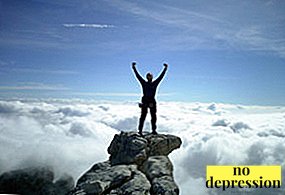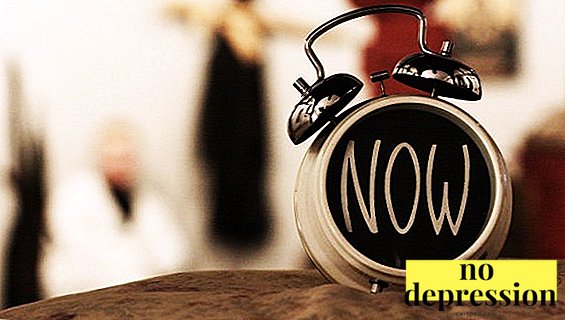If a person is accustomed to comfortable conditions and a passive strategy of behavior, then willpower for him is associated with negative emotions and tension.
But if the individual constantly "turns on" volitional elementOver time, it becomes very easy to mobilize your forces to complete the tasks.
Definition of concepts in psychology

Will - it is a directed control of behavior and activity (in the plane of conscious), aimed at overcoming the barriers of the internal and external nature.
By an effort of will, the individual can concentrate on the task demanding attention and suppress distracting impulses.
What is free will?
free will - this is the freedom to choose from a number of possibilities, which is limited only by the self-perception of a person and his interpretation of his own image of “I”.
Free will, however paradoxical it may sound, has a number of limiting or guiding factors.
These include attitudes, relationships with other members of society, upbringing, background desires, etc.
AND true willpower does not ignore these moments, but comes to a compromise decision, choosing and embodying the most optimal behavioral strategy in this situation.
Freedom and will - what is the difference? Freedom without will turns into arbitrariness. It provides an opportunity to perform any actions, but does not provide control over the situation.
It is the will that solves this problem, allowing the individual to predict the results of his actions and assess the expediency of actions.
Strong-willed personality traits

In the process of realization of the will and work on the destruction / correction of obstacles, a person seems to be works for development in certain qualities directly related to the act of will.
First stage:
- purposefulness (conscious and active desire to achieve the desired, through the implementation of certain actions);
- initiative (striving for vigorous activity);
- independence (the installation of a person in which he passes the instructions of strangers through an internal filter, refusing to act in accordance with the advice abhorrent to personal attitudes);
- excerpt (control over your own thoughts and actions, in order to overcome the factors that hinder the achievement of the goal).
Second stage:
- determination (ability to quickly make and further implement solid decisions);
- courage (the skill to overcome fear and risk for the sake of a potential positive result).
Third Stage:
- energy (the ability of the individual to mobilize all their resources to obtain the result of personal desire);
- perseverance (the ability of the individual to continuously maintain the strength for continuous work on the achievement of the goal);
- organization (the ability to plan activities to streamline it)
- discipline (the ability to bring their behavior in the form that meets the general rules and nuances of doing business)
- self control (the ability to ignore momentary impulses that run counter to the goal and the ability to subjugate its internal impulses).
Will as a mental process

Will is a mental process. Any manifestation of the will requires a person activation of the neuropsychic element, physical, mental and moral forces.
Volitional behavior is associated with overcoming barriers (time, space, attitude, exhaustion, emotional depression, etc.), since most goals are not achieved immediately after the planning stage, but after some time necessary to solve questions and problems.
Running away from his pursuers, a person can bypass many obstacles, but this will not be a volitional action, since the individual is subordinated to an external, not internal, stimulus.
Properties will:
- strength (indicator of "acceleration" of volitional effort);
- resilience (constancy of active manifestations in the conditions of recurring conditions);
- latitude (variety of activities that require volitional regulation).
Value
If a person has will power, his activity filled with meaning. The individual turns into a conscious personality, which acts on the basis of goals, and not on the basis of instincts.
From this power depends on human performance. It is simply impossible to achieve success without volitional efforts, as the organism will constantly switch to primitive needs or turn on the self-preservation (resource conservation) function in the face of problems and obstacles.
Also, if there is no willpower, the person will lose the moral contour, because it is the will that allows you to build your activity on the basis of the moral norms accepted in society.
If there is a will everything is achievablebecause a person can subordinate himself to the goal.
Physiological basis

The basics of volitional behavior at the physiological level begin with the front of the cerebral cortexwhere the traffic area is located.
It is associated with other parts of the cortex, including analyzers.
Thanks to this connection, the stimulus that has arisen in one of the sections of the cortex easily reaches the motor area and provokes the same process in it. But control is impossible without editing.
Therefore, the reticular formation (the formation stretching along the cerebral cortex) is very important because it acts as a filtering element (separates important impulses approaching the cortex from impulses that do not have a critical value).
Structure
A strong-willed action can be simple (the person immediately sees a possible short path to the goal and moves in this direction) and difficult (the goal leads to a struggle of motives).
The structure of a complex volitional action:
- Awareness of the final task (goal) and the desire to achieve it.
- Analysis and awareness of opportunities to achieve goals.
- The appearance of incentives confirming or denying this possibility.
- Confrontation of motives and choice.
- The adoption of one solution (from among the possible).
- The realization of the plan in reality.
- Overcoming external barriers and achieving goals.
Views in the table

The most common types (manifestations):
- courage (manifestation of volitional qualities in an extreme situation);
- discipline (manifestation of volitional qualities in the case when the emotional and physical state impedes the achievement of the goal);
- determination (the ability to make complex and responsible decisions without help, while ignoring the obstacles);
- patience (mobilization of volitional qualities in the conditions of prolonged tension or stagnation);
- faith in one's own strength (confidence in his own success, even in the face of difficulties).
Modern science divides will into three dominant in the mind of the species.
View | Value |
Free or spiritual will | Characteristic to believers. A strong-willed action in which a person, guided by higher goals (faith), makes a difficult decision. |
Natural will | The ability to make simple choices, to think, to bring their behavior in accordance with personal principles, etc. |
Forced will | The ability to comply with a certain behavioral strategy in a forced mode, as a response to difficult life circumstances. |
Properties
Properties will:
- has a stable relationship with the concept of "must";
- forms and requires the formation of a detailed intellect-plan that guarantees movement towards the goal;
- conscious mediation;
- involvement in the volitional act of other mental processes (attention, memory, intellectual activity, etc.).
Functions
There are three functions, each of which can replace another function as needed in the process of volitional act.
- Initiating. Encourages a person to start implementing certain strategies, “include” a certain pattern of behavior or activity in order to overcome barriers.
- Stabilizing. It is aimed at maintaining human activity in the period of stagnation or the appearance of new hindrances on the way to the goal.
- Inhibitory. It is aimed at inhibiting incentives and motives that are not related to the main goal and interrupt the main desire to achieve what was intended.
A separate block is the genetic, generative and productive function, through which the volitional characteristics of the personality are formed.
The main functions of the will - scheme:

Main features
Signs of a volition:
- efforts made to implement the strategy of behavior;
- a clear plan for the implementation of a behavioral act, leading to the result;
- concentration on the behavioral act and the lack of pleasant sensations in the process of activity;
- often, the will is not focused on overcoming external barriers, but on overcoming one’s own laziness / weakness / unwillingness, etc.
Theories: briefly

Historically, the concept was considered through philosophical-aesthetic and natural science approach.
But the view of the will changed and transformed constantly.
Science identifies several key psychological theories:
- Ancient representations. The philosophers of ancient Greece believed that the root of conscious action was hidden in the mind. Aristotle tied the will and logical conclusions in a bundle, considering the first as a consequence of the second. In the Middle Ages the will is not singled out in a separate, requiring consideration of the issue. Scientists and theologians of the Middle Ages denied the existence of active principle in man, since they saw people dependent on divine power.
- Renaissance. Man began to be treated as a person, attributing to him a creative streak and the right to make mistakes. In this case, the main advantage of the individual began to consider freedom of will. A. Camus, K. Jasper and M. Heidegger they deal with the question of freedom, ascribing to it absolute will, not limited by external and social conditions.
The person in this theory is not connected with society, including the moral element and responsibility.
- Natural science interpretation. In the writings of I.P. Pavlov's will was the “instinct of freedom” and a reaction to the restriction of a person’s natural activity. In its power, this instinct can compete with the hunger instinct. Pavlov considered it as a reflex phenomenon.
- Will as consciousness. Volitional activity is considered as active, leaving the person the right to regulate this activity and forms of behavior. The theory was supported by the works of N.A. Brunshteyn and P.K. Anokhin.
- Other views. Sigmund Freud and E. Fromm viewed this phenomenon as a transformed human biological energy. K. Lorenz sees aggression in this energy. K.G. Jung and A. Adler notice the relationship of will and social factors.
Diagnostics

Methods of analysis of volitional sphere can be divided into two basic groups:
- extensive;
- experimental.
Extensive methods imply finding a subject under natural conditions and studying a picture using an evaluation method, a method of self-assessment and generalization of characteristics, testing, interviewing, interviewing, etc.
Experimental methods imply laboratory conditions and a pre-prepared plan of experience.
Research methodology
The development of the will occurs gradually. If at the initial stages of personality formation a child performs involuntary actions, then gradually he comes to understand the need for volitional regulation of behavior.
To analyze the degree of development of the will of the individual, apply special techniques:
- Characteristics of volitional effort. The test subject holds a dumbbell weighing 1 kg in an outstretched hand, describing the sensations according to the proposed scale (tired, very tired, etc.)
- Rosenbat method. The maximum possible tension of a hand with the subsequent increase in loading.
- Tapping test. Analysis of the potential of muscular efforts by controlled and uncontrolled hitting the square in the handle.
- Foot balance.
- Stability volitional effort. Proofreading text for the purpose of searching for typos and further analysis of the results.
- Breath hold (analysis based on the duration of the exercise and the behavior of the experimental) according to the method of S.V. Korzh.
- Special questionnaires.
Disorders and disorders

Hypobulia - decrease in volitional activity.
A person loses the desire for any activity and starting to engage in a job quickly throws him away (due to lack of interest, and not difficulty in performing).
Individuals with hypobulia are characterized by low mobility.
Abulia - pathology associated with impaired mental regulation. A person acquires a chronic form of lack of will and lack of initiative. He cannot lean toward a decision and take action.
Hyperbulia - unproductive human activity, often exceeding a reasonable amount of activity.
Parabulia - distortions in the sphere of volitional activity.
Paralysis of the will or prokastinatsiya manifest in the form of unwillingness to start any activity, the desire to postpone it and hide from activity.
In order to solve the problems of self-control, to train the necessary habits of overcoming oneself and external barriers, it is necessary to study in more detail the mechanism of the work of the ox force (for example, according to the book Ilyin EP: "The Psychology of the Will").
Serious pathologies of volition require the intervention of specialists and the elaboration of internal conflicts.
Concept, types and theories of the will:



